|
|
|
Sort Order |
|
|
|
Items / Page
|
|
|
|
|
|
|
| Srl | Item |
| 1 |
ID:
107112
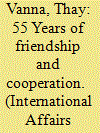

|
|
|
|
|
| Publication |
2011.
|
| Summary/Abstract |
MAY 13 OF THIS YEAR marks the 55th Anniversary of diplomatic relationship between the Russian Federation and the Kingdom of Cambodia. I have the honor, on this occasion, to convey, on behalf of the Royal Government and the people of Cambodia and on my own behalf, to the government and the people of the Russian Federation greetings and assurances of their sincere feelings towards your country.
|
|
|
|
|
|
|
|
|
|
|
|
|
|
|
|
| 2 |
ID:
107103


|
|
|
|
|
| Publication |
2011.
|
| Summary/Abstract |
THE DECEMBER 2010 ISSUE of Negocies Estrangeiros, official biannual of the Portugal Diplomatic Institute at the Foreign Ministry of Portugal, carried a detailed analytical forecast by Joao Fabio Bertonha, professor of history at the State University of Maring (Brazil). The journal deals mainly with topical issues of Portugal's foreign policy, foreign economic activities and historical and cultural contacts with the rest of the world. It appears in Portuguese with some of the materials published in English.
Issue 18 deals with a selection of articles on various subjects and in different genres contributed by Portuguese and foreign authors; information materials coexist here with fundamental analytical studies, a veritable feast for inquisitive minds.
|
|
|
|
|
|
|
|
|
|
|
|
|
|
|
|
| 3 |
ID:
107104
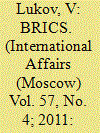

|
|
|
|
|
| Publication |
2011.
|
| Summary/Abstract |
SINCE THE FIRST SUMMIT of BRIC on June 16, 2009, its work has attracted growing international interest. And this is not surprising. The BRIC forum, whose creation was initiated by Russia, has rapidly developed into a real factor of world politics.
Today it includes five countries (Brazil, Russia, India, China, and the Republic of South Africa), which account for 25% of world GDP (at purchasing power parity), 30% of the territory of the Earth, and 45% of the world population.
The Third Summit of the BRICS countries held in Sanya (Hainan Island, China) on April 14, 2011, has shown a significant strengthening of the group's international positions since the previous meeting of its leaders in Brazil on April 15, 2010.
|
|
|
|
|
|
|
|
|
|
|
|
|
|
|
|
| 4 |
ID:
107108


|
|
|
|
|
| Publication |
2011.
|
| Summary/Abstract |
THE BRICS SUMMIT that recently ended on the Chinese isle of Hainan was, without exaggeration, one of the most important events of the year for Chinese diplomacy. It can only be compared to Hu lintao's visit to the USA. Such a comparison is apt, because Beijing tried to outline its new approach to foreign policy in the course of these two events. In this context, the word "new" refers not to qualitative change but to the restructuring and readjustment of already existing mechanisms. Such a conclusion, bold though it may seem, is backed up by solid arguments. The need to take a more active stance has begun to be discussed in Chinese society and the press, while recent events have shown that it is becoming increasingly difficult for China to remain an onlooker in international events. Thus Beijing, with its typical pragmatic sense, has decided not to jump recklessly into the water but to begin by analyzing different possibilities and choosing a balanced mechanism for coming out into the global limelight. One of the latter's elements should be BRICS.
|
|
|
|
|
|
|
|
|
|
|
|
|
|
|
|
| 5 |
ID:
107106


|
|
|
|
|
| Publication |
2011.
|
| Summary/Abstract |
THE APRIL SUMMIT of the five most influential states of Eurasia, Asia. Latin America, and Africa (South Africa joined the BRIC, to transform it into the BRICS, at the April Summit) received a great share of attention. As could be expected, it echoed far and wide across the world which learned that there are countries able and determined to insist on new formulas of international cooperation for the sake of sustainable economic growth and the world community's secure development geared at social imperatives and ecological restrictions. This attention and this response are quite understandable: the new centers of world economics and politics on which, it seems, the future of the planet's population depends have mastered the practice of collective decisions and collective actions.
|
|
|
|
|
|
|
|
|
|
|
|
|
|
|
|
| 6 |
ID:
107107


|
|
|
|
|
| Publication |
2011.
|
| Summary/Abstract |
"We are convinced of the necessity to strengthen the tendency for the creation of a polycentric, more equitable and democratic world that relies on the methods of network diplomacy."1
Sergei Lavrov, Foreign Minister of the Russian Federation
IN NOVEMBER 2001, Jim O'Neill, head of global economic research group of Goldman Sachs, one of the largest Wall Street investment banks, in his analytical paper suggested to unite, on the strength of certain criteria, Brazil, Russia, India, and China, four larger emerging market economies, into a virtual club which he called BRIC. Its instant success caught everyone unawares even though Karl Marx back in the 19th century had warned that once the idea gripped the masses it became a material force.
|
|
|
|
|
|
|
|
|
|
|
|
|
|
|
|
| 7 |
ID:
107098
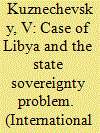

|
|
|
|
|
| Publication |
2011.
|
| Summary/Abstract |
CONCERNED WITH THE FLARE-UPS of popular revolutions in North Africa and the Middle East in March and April and the events in the Libyan Arab Jamahiriya, in the first place, the world community turned its gaze at the United Nations and its role in conflict settlement. The public and the UNSC tried to outline the limits beyond which no international interference in domestic policies was acceptable. In short, the world community wanted to know how state sovereignties could be preserved in the contemporary world; in fact, the future of the Westphalian principles is at stake. The Libyan crisis was unfolding to the accompaniment of the media deliberations, in Russia and the West, that the Westphalian principles should be abandoned. Nikolai Zlobin, a Russian migr living in the United States, Director of Russian and Asian Programs at the Washington-based World Security Institute, published in Rossiiskaia gazeta, the newspaper of the RF government, a long article called "Konets suverenitetov" (The End of Sovereignties). He has come close to admitting that the international law based on the Westphalian principles is a thing of the past. "The tragedy in Japan or, for example, in Libya has shown that the national sovereignty cannot be protected any longer," he writes. In the 21st century, he goes on to say, "the priority of national sovereignty per se vs. the world community's basic interests can no longer be preserved; the same applies to the principle of non-interference in domestic affairs and inadmissibility of ensuring safety of a country, region or people by external forces; otherwise the world community will have to pay dearly. At least this is how I see it from Washington.
|
|
|
|
|
|
|
|
|
|
|
|
|
|
|
|
| 8 |
ID:
107093
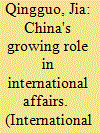

|
|
|
|
|
| Publication |
2011.
|
| Summary/Abstract |
International Affairs: Mr. Jia Qingguo, can you outline for our readers the main points of China's foreign policy?
Jia Qingguo: In the current international context peace and development are China's main aims. Peace is our priority which we share with many other countries. In view of this global task our diplomacy treats a favorable international context, viz. a safe and stable system on our planet as the task of prime importance. Beijing is doing a lot to establish good or even friendly relations with the majority of countries. Its growing might and wider opportunities explain why the world community is paying much more attention to what is going on in China. We expect that in due course this will create a positive global environment. We need peace even though local conflicts are unavoidable; we should try to avoid fatal clashes and wars between great powers.
|
|
|
|
|
|
|
|
|
|
|
|
|
|
|
|
| 9 |
ID:
107091
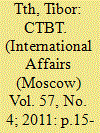

|
|
|
|
|
| Publication |
2011.
|
| Summary/Abstract |
International Affairs: Mr. Tth, the Comprehensive Nuclear-Test-Ban Treaty (CTBT) is one of the main elements of the world's nuclear security. What does your Preparatory Commission expect to accomplish?
Tibor Tth: Practically, compared to the big brothers and big sisters in this building, which houses many other international organizations, we are a teenager, we will be 15 years old as a treaty on 24 September; as an organization, we are 14 years old. We came 40 years later than the IAEA yet we are doing very complimentary things. There is a relationship between what IAEA is supposed to do and what we are supposed to do. IAEA is trying to prevent a potential misuse of technologies, misuse of fissile material and misuse of facilities. If it fails and if countries try out weapons they create as a result of diverting fissile material technologies for military purposes the results will appear on the screen. NPT belongs to the IAEA context; I think that the test ban treaty as an organization is part of a wider NPT regime.
|
|
|
|
|
|
|
|
|
|
|
|
|
|
|
|
| 10 |
ID:
107099
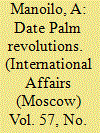

|
|
|
|
|
| Publication |
2011.
|
| Summary/Abstract |
THERE ARE A NUMBER of noteworthy features in the recent wave of revolutionary events that have swept across North Africa, successfully dismantling an array of political regimes that previously seemed to be absolutely stable and unshakable.
First, all of them developed (and in the case of Libya, are continuing to develop) according to the same scenario, or "revolutionary template," very reminiscent of a "color revolution" scenario.
Second, "revolutions" in different states of North Africa erupted almost simultaneously, which almost always precludes any element of chance and suggests a high level of coordination (in time) from a "revolutionary center" abroad or the conduct of a special operation thoroughly planned by outside forces.
|
|
|
|
|
|
|
|
|
|
|
|
|
|
|
|
| 11 |
ID:
107114
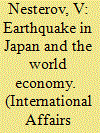

|
|
|
|
|
| Publication |
2011.
|
| Summary/Abstract |
THE FULL EXTENT OF THE DAMAGE caused to the Japanese economy by the March 11 earthquake and tsunami has yet to be assessed, but experts say that it could be the worst in the country's history.
Hundreds of plants and factories across Japan, including Toyota and Nissan car factories, were shut down as a result of damage or power outages. Electricity suppliers were obliged to impose rolling blackouts throughout the country because they could not meet demand. Thousands of homes were destroyed, and about 2 million people were left without electricity and water. AIR Worldwide, a U.S.-based consulting group, predicted on March 13 that insured property losses from the earthquake alone would range from $15 billion to $35 billion.
|
|
|
|
|
|
|
|
|
|
|
|
|
|
|
|
| 12 |
ID:
107115
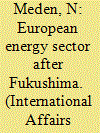

|
|
|
|
|
| Publication |
2011.
|
| Summary/Abstract |
THE EUROPEAN COMMISSION'S RESPONSE to the Fukushima nuclear disaster is at odds with conventional notions of a cumbersome EU bureaucracy. The decisions to conduct stress tests on European nuclear power plants (NPPs) and develop a new set of nuclear safety standards were made very quickly. A lively debate is underway at the expert level on how the EU energy sector should develop considering Japan's bitter experience. The debate takes place at a time when the European Commission is working on a document laying down guidelines for EU energy policy to 2050, and in this sense it can influence the EU's long-term strategy, which is also important to Russia.
|
|
|
|
|
|
|
|
|
|
|
|
|
|
|
|
| 13 |
ID:
107096
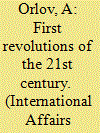

|
|
|
|
|
| Publication |
2011.
|
| Summary/Abstract |
THE PROTEST WAVE that started in Tunisia in January has spread to a significant part of the Middle East and North Africa. To some degree or other, it has affected about 10 states with ruling regimes collapsing in two countries (as of press time) and with three being in an exclusively difficult situation, fraught with collapse. When, not so long ago, mankind was joyfully seeing in the New Year, 2011, no one even had an inkling of an imminent large-scale upheaval in the Arab world. So the legitimate question is: What happened next and how should the ongoing developments in this volatile part of the world be defined?
|
|
|
|
|
|
|
|
|
|
|
|
|
|
|
|
| 14 |
ID:
107119


|
|
|
|
|
| Publication |
2011.
|
| Summary/Abstract |
"I AM ASKING YOU to send me back home... My presence is not necessary to do what needs to be done here, they'll manage perfectly well without me, and I'm not needed here. In the present circumstances, I don't see any need or justification for being here as an individual or as the Deputy Chief of Staff of the Red Army, in which capacity I arrived and am known here."1 This telegram was sent by Lieutenant General Filipp Golikov to Commander-in-Chief Joseph Stalin, People's Commissar of Foreign Affairs V. Molotov, and Chief of Staff of the Red Army Marshal B. Shaposhnikov on August 25, 1941.
|
|
|
|
|
|
|
|
|
|
|
|
|
|
|
|
| 15 |
ID:
107117


|
|
|
|
|
| Publication |
2011.
|
| Summary/Abstract |
PRINT AND ELECTRONIC MEDIA abound with different versions, hypotheses, thoughts, myths, and fantasies about the beginning of the German invasion of the Soviet Union, the aggressor's aims, the USSR's readiness before the invasion, the "number and kind of boots and maps that were brought to the border," etc., etc. We hope that the present study will finally "dot the i's and cross the t's" and give answers to many questions.
|
|
|
|
|
|
|
|
|
|
|
|
|
|
|
|
| 16 |
ID:
107095


|
|
|
|
|
| Publication |
2011.
|
| Summary/Abstract |
A HUNDRED AND FIFTY YEARS AGO, America entered its bloodiest war that was to last four years. The Civil War between the North and the South cost the lives of 620,000 people, which is almost equal to total American losses in all other wars. Two out of every three Americans have ancestors that went through the crucible of this war - a figure that debunks the myth that the USA has become great thanks to subsequent fertile strata of immigrants.
|
|
|
|
|
|
|
|
|
|
|
|
|
|
|
|
| 17 |
ID:
107123


|
|
|
|
|
| Publication |
2011.
|
| Summary/Abstract |
Elena Nikolaevna Meiendorf: I love Russia... Our family has lived here for more than 800 years. My ancestors came to Russia from Germany. But if we delve into history, our family can be traced back to the Vikings. Pope Clement II came from the Meiendorfs and served as archbishop of the town of Bamberg, one of Germany's most beautiful cities. At that time, Emperor Henry III had a very strong influence on the political life of Europe. And he did not like all the terrible troubles going on in Rome - popes and antipopes... So he put his German archbishop, Suidger von Meiendorf, on the papal throne, who was given the new name of Clement II.
|
|
|
|
|
|
|
|
|
|
|
|
|
|
|
|
| 18 |
ID:
107111


|
|
|
|
|
| Publication |
2011.
|
| Summary/Abstract |
Antonio Zanardi Landi: The decision to hold a Russia-Italy Cross-Cultural Year was made in November 2008 during the Italian-Russian intergovernmental consultations. Nearly all of our cultural events under this Cross-Cultural Year - I'd like to stress - happen at the time of another event of major significance to us - 150 years of Italian unification which we marked on March 17.
|
|
|
|
|
|
|
|
|
|
|
|
|
|
|
|
| 19 |
ID:
107121


|
|
|
|
|
| Publication |
2011.
|
| Summary/Abstract |
OFFICIALS IN RIGA once again claimed that members of the Latvian SS Waffen Legion were innocent. They did this shortly before March 16. 2011 marked in Latvia by surviving Waffen SS veterans and their admirers. In particular, the Foreign Ministry of the Republic of Latvia put on its website appropriate documents of the International Military Tribunal at Nuremberg in an attempt to refute, in retrospect, the Tribunal's ruling that the Latvian SS Legion was a "criminal group" "consisting of persons who were officially admitted as SS members." There was a reference to that part of the Tribunal's ruling which speaks of excluding from the "criminal group" "those individuals who were recruited into this organization by government agencies in a manner that left them no other opportunity, as well as other persons who have not participated in the commission of similar crimes." The Latvian diplomats' seeking excuses is part and parcel of the policy of glorification of the SS Legion, whose essence is spelled out in the still valid declaration of Latvia's Saeima (parliament) on Latvian Waffen SS Legion members of October 29, 1998. This document says: "The objective of the Latvians, both drafted and voluntarily enlisted in the Legion, was to protect Latvia against the restoration of the Stalinist regime. They had never participated in the punitive actions of the Nazis against civilians."
|
|
|
|
|
|
|
|
|
|
|
|
|
|
|
|
| 20 |
ID:
107090


|
|
|
|
|
| Publication |
2011.
|
| Summary/Abstract |
THE FAST MOVING controversial developments in the Middle East and North Africa seem to be sidelining the search for responses to some fundamental security challenges in the region. This refers, for example, to the discussion of steps for the preparation and successful conduct of next year's conference on the establishment of a nuclear-weapon-free zone (NWFZ) in the Middle East. Furthermore, some people think that there is not a favorable environment for such a conference now or in the foreseeable future.
|
|
|
|
|
|
|
|
|
|
|
|
|
|
|
|
|
|
|
|
|